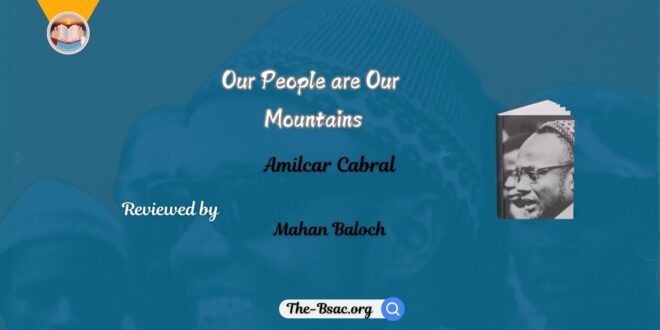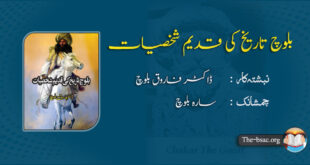Our People Are Our Mountains by Amílcar Cabral
Book Review By: Mahan Baloch
Amílcar Cabral’s Our People Are Our Mountains is a profound exploration of the role of politics in the struggle for national liberation. Drawing from his experience and leading the fight for independence against Portuguese colonialism in Guinea-Bissau and Cape Verde. Cabral emphasizes the vital relationship between politics and armed struggle. The book delves into the importance of ideology, leadership, and the connection between the people and the liberation movement.
Cabral elaborates his thoughts accordingly:
Centrality of Politics in Liberation Struggles:
One of the key messages Cabral conveys is that politics is the foundation of any liberation struggle. He argues that while armed struggle is often necessary in the fight against colonialism, it must be guided by strong political principles and ideology. Without a political framework, the fight for freedom cannot succeed.
Cabral stresses the need for clear political objectives, as he explains through a metaphor: “A rice can only be cooked inside the pot, even if you have fire; you can’t cook rice outside the pot.” In the same way, a fight without political direction will not lead to true independence.
Armed Struggle as a Response to Colonial Violence:
Cabral discusses how colonial powers like Portugal used force to maintain their rule, leaving the colonized people with no choice but to respond in kind. He outlines two types of forces necessary in a liberation struggle: local armed forces and national armed forces. The coordination of these forces is crucial in confronting colonial power. Despite the necessity of armed struggle, Cabral emphasizes that the struggle is ultimately political. The beginning and end of every liberation effort, he argues, are rooted in politics.
The Role of the People in the Struggle:
One of the book’s most famous passages highlights the centrality of the people in the liberation struggle: “Our people are our mountains.” Cabral explains that just as mountains offer protection and strategic advantages in warfare, the people provide the support and foundation for the struggle. Without their involvement and belief in the cause, success is impossible. Cabral illustrates this point through the story of an Italian journalist who asked a child in a school in Guinea, “Aren’t you tired of this long struggle?” The child’s reply encapsulates the resilience and commitment of the people: “It is for the Portuguese to be tired of it, not us. It’s our country.”
The Importance of Ideology:
Cabral emphasizes the significance of ideology in guiding the liberation movement. For him, a struggle cannot be waged effectively without a clear set of ideas and principles. Ideology gives purpose to the fight and ensures that the movement remains focused on its political objectives rather than devolving into chaos. He encourages leaders of liberation movements to study the experiences of others but to also find their solutions based on the specific conditions they face. Each struggle is unique, and while external experiences are valuable, every movement must develop its strategies and methods.
Education and Awareness:
Throughout the book, Cabral underscores the importance of educating the people about the nature of the struggle. He believes that understanding why they are fighting is key to maintaining morale and commitment. This is especially important for children, who must be brought up with the knowledge of their country’s history and the reasons for the fight for independence. By ensuring that everyone—young and old—understands the political struggle, the movement can stay unified and focused on its ultimate goal of liberation.
Conclusion:
Our People Are Our Mountains is more than just a manual for guerrilla warfare; it is a profound political manifesto that highlights the inseparability of armed struggle and political ideology in the fight for independence. Amílcar Cabral’s insights continue to resonate with liberation movements worldwide, particularly his emphasis on the role of the people, the importance of ideology, and the need for political clarity in achieving freedom.
For anyone interested in revolutionary politics, anti-colonial struggles, or the broader dynamics of liberation movements, this book offers essential lessons. It demonstrates that true independence is not just won on the battlefield but through the hearts and minds of the people and a well-organized political effort.




